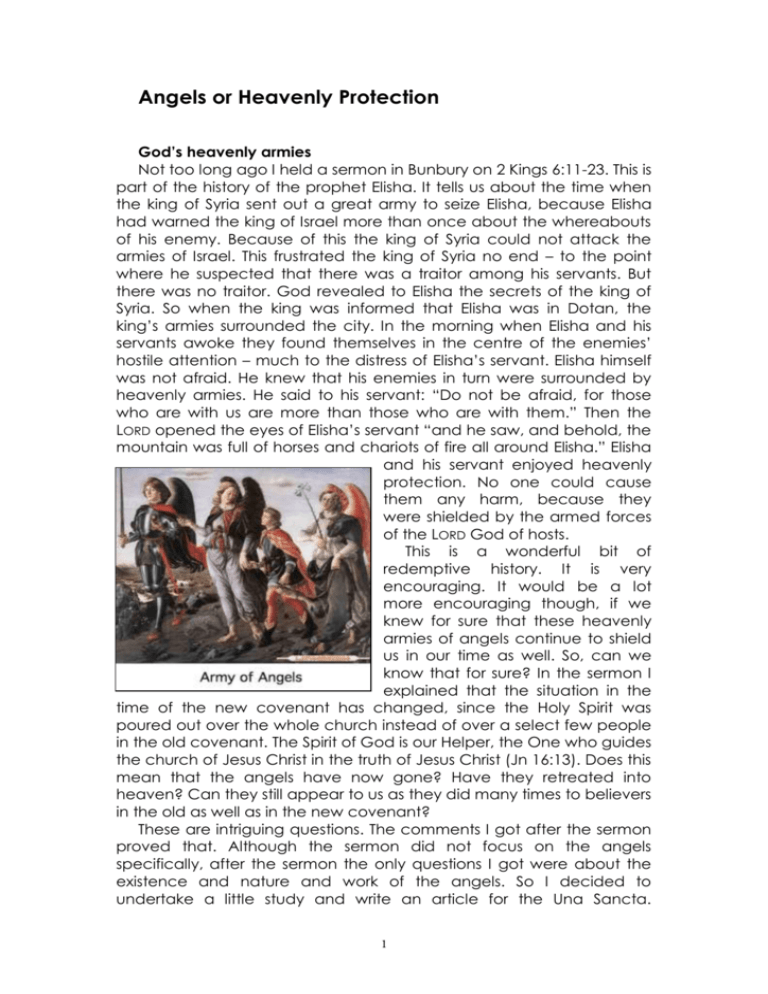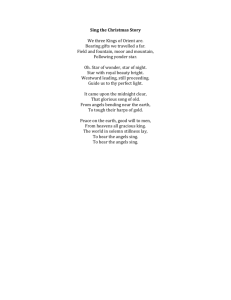Word
advertisement

Angels or Heavenly Protection God’s heavenly armies Not too long ago I held a sermon in Bunbury on 2 Kings 6:11-23. This is part of the history of the prophet Elisha. It tells us about the time when the king of Syria sent out a great army to seize Elisha, because Elisha had warned the king of Israel more than once about the whereabouts of his enemy. Because of this the king of Syria could not attack the armies of Israel. This frustrated the king of Syria no end – to the point where he suspected that there was a traitor among his servants. But there was no traitor. God revealed to Elisha the secrets of the king of Syria. So when the king was informed that Elisha was in Dotan, the king’s armies surrounded the city. In the morning when Elisha and his servants awoke they found themselves in the centre of the enemies’ hostile attention – much to the distress of Elisha’s servant. Elisha himself was not afraid. He knew that his enemies in turn were surrounded by heavenly armies. He said to his servant: “Do not be afraid, for those who are with us are more than those who are with them.” Then the LORD opened the eyes of Elisha’s servant “and he saw, and behold, the mountain was full of horses and chariots of fire all around Elisha.” Elisha and his servant enjoyed heavenly protection. No one could cause them any harm, because they were shielded by the armed forces of the LORD God of hosts. This is a wonderful bit of redemptive history. It is very encouraging. It would be a lot more encouraging though, if we knew for sure that these heavenly armies of angels continue to shield us in our time as well. So, can we know that for sure? In the sermon I explained that the situation in the time of the new covenant has changed, since the Holy Spirit was poured out over the whole church instead of over a select few people in the old covenant. The Spirit of God is our Helper, the One who guides the church of Jesus Christ in the truth of Jesus Christ (Jn 16:13). Does this mean that the angels have now gone? Have they retreated into heaven? Can they still appear to us as they did many times to believers in the old as well as in the new covenant? These are intriguing questions. The comments I got after the sermon proved that. Although the sermon did not focus on the angels specifically, after the sermon the only questions I got were about the existence and nature and work of the angels. So I decided to undertake a little study and write an article for the Una Sancta. 1 Reading through some literature I found more and more that the spiritual world is a very fascinating subject. I hope that in this and subsequent short articles I will be able to convey some of that fascination onto you, and in the process also answer a few questions about these heavenly helpers. Angel-mania vs Angel-ignorance The theological science that occupies itself with the existence and work of the angels is called Angelology. Although you would conclude from the very existence of this name and discipline that the study of angels ought to be taken very seriously, you might think differently if you consider the number of pages in books and articles in our Reformed tradition that are dedicated to the subject. Herman Bavinck, who himself spends only 30 pages on the Spiritual World out of the approximately 2500 pages that make us his 4 volumes of his Reformed Dogmatics1, says on page 450 that in this respect “the Reformed churches tended to sin more by defect than by excess.” In other words, in Reformed theological literature not much attention is given to the angels. That does not mean that angels are not considered important or relevant. On the contrary, the articles and books that are written on the subject definitely give witness of great wonder and awe at these wonderful beings. However, it is safe to conclude with someone who said that in Reformed theology the angels suffer from benign neglect. Even in our own confessions angels are not mentioned very often. In art. 12 of the BC they are mentioned as among the creatures of God. And in LD 49 they are held up as examples to us in the context of the third petition: “Grant that everyone may carry out the duties of his office and calling as willingly and faithfully as the angels in heaven.” I think that there is a good explanation for the relative absence of the angels in our confessions. But more about that later. Compared to the lack of attention given to the angels in our churches, the attention given to them in popular and charismatic theology is truly overwhelming. Just search for angels in Koorong’s website and you will see more than 200 hits. Admittedly, some of them are not books, but little figurines you can hang in a tree or other angelic tidbits. But that only serves to emphasize the point. There are books about ‘finding your inner angel’, or about how to contact the angels and communicate with them. Not only Christians, but the secular world as well loves In this and following articles I will not tire you with a bunch of footnotes. In will include a list of literature in the last installment – possibly give a few recommendations for further study. 1 2 angels. Besides books and medallions and earrings of angels, there are DVD’s and even television series about them. Most of these things we will find rather absurd, and rightly so. At the same time it makes you wonder why angels are so popular in, say, general or secular religion and beliefs, and not so well known in our Free Reformed churches? Why this angel-mania in the world, and this angel-ignorance in the church? Non-judgmental substitute religion When you read through some popular books about angels, you quickly find that angels are considered friendly creatures. They are there to help you, to support you in your troubles. They will comfort you and protect you from harm. In those books there is no mention of the angel of the LORD of whom it is said in 2 Ki 19:35: “And that night the angel of the LORD went out and struck down 185,000 in the camp of the Assyrians. And when people arose early in the morning, behold, these were all dead bodies.” We find no reference to 2 Sam 24:15-16 either where we read: “So the LORD sent a pestilence on Israel from the morning until the appointed time. And there died of the people from Dan to Beersheba 70,000 men. And when the angel stretched out his hand toward Jerusalem to destroy it, the LORD relented from the calamity and said to the angel who was working destruction among the people, It is enough; now stay your hand.” In fact, come to think of it, you hardly find any reference to the Bible at all! Why would people believe in angels? Well, perhaps because they are thought to be non-judgmental and kind. They are not demanding. They only give, they never ask. Many people in this day and age have had enough of the church. They identify the church with rules and regulations, rather than salvation and peace. It is part and parcel of our post-modern society that people dislike organizations and big words, but instead seek truth in experience and emotions. That is where the belief in angels fits in beautifully. They have no rules or regulations. They add that bit of religious spice to your life. Believing in angels is easy and non-confrontational. Just try to start a conversation with your hairdresser about your faith. Your question: “I believe in God and go to church. How about you?” will probably receive a very short, if any, answer. But then try: “I believe in angels. They protect me. What do you think?” I am sure that many people will be interested and perhaps be able to tell you stories about their own guardian angel or other spiritual experiences. Angels are interesting and they do not judge. They are always there to help and protect you. Isn’t that nice and convenient? A spiritual donkey 3 Although this kind of substitute angel religion is rather absurd, we should not, in some kind of knee-jerk reaction, ignore the position and work of the angels altogether. Angels are very relevant to the Christian faith. In the Bible they play a major role in redemptive history. They are mentioned well over 250 times, more than half of those in the New Testament. If they are so important in the Bible, then we should at least ask ourselves the question if they are still important for us in our time. I can’t help but think of Balaam and his talking donkey. Balaam was so focused on his own business (which was getting rich quickly) that he did not see the Angel of LORD standing in his way. But his donkey was more spiritual than he. The Angel of the LORD said to Balaam: “Why have you struck your donkey these three times? Behold, I have come out to oppose you because your way is perverse before me. The donkey saw me and turned aside. If she had not, surely just now I would have killed you and let her live.” We better be aware of the spiritual dimension of our lives. We must not be consumed by going after money and pursuing our ambitions. Our lives must be spiritual lives. And angels, as we will see, play an important role in that spiritual dimension of our lives. However, at the same time, any undue attention for angels must not distract from our worship of the triune God. Perhaps that is the reason why our confessions do not mention them very often. Unlike what popular beliefs say, angels do not save us. Angels have not died for us. They are not even necessary for our salvation. In fact, God chooses to use them to carry out his orders, but he does not need them. As if he was powerless or limited if he did not have angels to work for him. In that sense, angelology is not a cardinal doctrine. But if we give appropriate attention to these wonderful creatures, it will help us understand God’s Word and his work in redemptive history. In the following articles we will see that angels have been involved in every great event in redemptive history. So when we study them, it is not to draw closer to them, or to invoke their help and protection. Studying angels should bring us closer to their Master, our almighty God! That is our aim. So let us find our Biblical way passing between the rock of angel-mania and the hard place of angel-ignorance. E. Rupke 4






